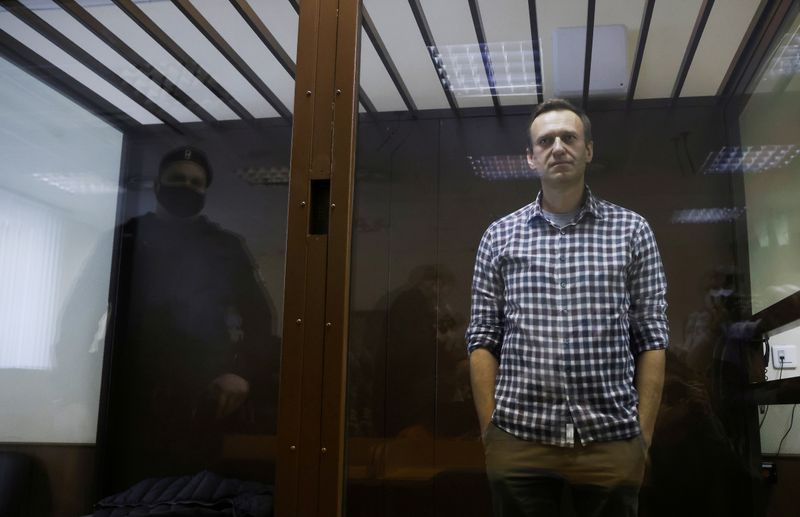MOSCOW (Reuters) - Staff at the Russian prison holding hunger-striking Kremlin critic Alexei Navalny are threatening to force feed him, his allies said on Monday, warning he had lost 15 kg since he arrived at the facility last month.
Navalny, 44, a prominent opponent of Russian President Vladimir Putin, announced a hunger strike at the end of March in protest at what he said was the refusal of prison authorities to treat him properly for acute back and leg pain.
They say they have offered him proper treatment, but that he has refused it, insisting that he wants to be treated by a doctor of his choice from outside the facility, a request they have declined.
Navalny, whom the West says has been wrongly jailed and should be freed, was moved to a prison clinic earlier this month after complaining of a high temperature and a bad cough.
On Monday, his Twitter account, which his allies use to provide updates based on information from his lawyers who regularly visit him, said he had been discharged from the prison's medical facility.
"Given the severity of the hunger strike, the (prison)administration is threatening on a daily basis to start force-feeding," the account said.
There was no immediate comment from the state prison service. The regional prison service did not immediately reply to a request for comment.
Navalny's weight has fallen to 77 kg, a drop of 15 kg since he arrived at the prison facility 100 kilometres (62 miles) east of Moscow, his allies said.
Navalny had already lost 8 kg in the facility before beginning his hunger strike, his allies said on April 1, something they blamed on guards deliberately depriving him of sleep.
Prison authorities deny depriving him of sleep and have said previously that Navalny's condition was satisfactory and that he has been provided with all necessary treatment.
Navalny's allies want an outside doctor of his choice to be able to check his condition.
His Twitter account said on Monday that a doctor had still not been allowed in to see him. It said his pulse was averaging 106 beats per minute, a reading that is higher than normal. His blood pressure was at 94/76, it said.

Navalny returned to Russia in January after recovering from what German doctors say was a nerve agent poisoning. He was jailed in February on charges he said were trumped up for two and a half years. Russia has said it has yet to see evidence he was poisoned